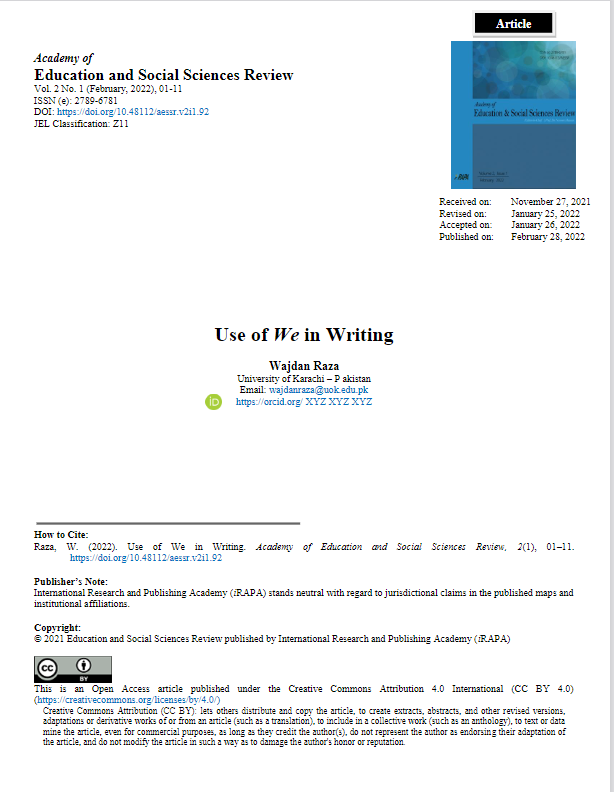Use of We in Writing
DOI:
https://doi.org/10.48112/aessr.v2i1.92Abstract
 Abstract Views: 291
Abstract Views: 291
Pronouns are few and fixed, but used frequently in language and their forms and functions have been reviewed in the past. The qualitative study theoretically underpinned by various linguistic philosophers is a teacher’s reflection about the use of English pronoun we in ninety-six extended written responses of English language learners studying two disciplines of knowledge in a public institution of higher education in Karachi. The data were collected from ninety-six participants in 2018, analyzed in 2019 and drafted in 2020. The occurrence of the royal we in the sentences of the participants was reportedly too low to connect it with exclusive-we. However, its deictic use was a frequent representation of togetherness. The study’s usefulness lies with further investigations into this linguistic behavior of the pronoun among its users.
Keywords:
English language proficiency, pro-form, pronoun, use of weReferences
Bergmann, C., Paulus, M., & Fikkert, P. (2012). Preschoolers' comprehension of pronouns and reflexives: the impact of the task. Journal of Child Language, 39(4), 777-803. https://doi.org/10.1017/S0305000911000298
Brown, R., & Gilman, A. (1968). The Pronouns of Power and Solidarity. In J. A. Fishman (Ed.), Readings in the Sociology of Language (pp. 252-275). The Hague: Mouton & Co. N.V. Publishers. http://dx.doi.org/10.1515/9783110805376.252
Contemori, C., Mossman, S., & Ramos, A. K. (2021). Acquiring L2 pronoun interpretation biases: Implicit learning at the discourse level in L2 English. Studies in Second Language Acquisition, 1-18. https://doi.org/10.1017/S0272263121000152
Cooper, L. A., & Shepard, R. N. (1973). Chronometric studies of the rotation of mental images. In Visual information processing (pp. 75-176). Academic Press.
Corder, P. (1973). Introducing applied linguistics. Australia: Penguin Edition.
Downing, A., & Locke, P. (1992). A university course in English grammar. UK: Prentice Hall.
Heine, B., & Song, K. A. (2011). On the grammaticalization of personal pronouns1. Journal of Linguistics, 47(3), 587-630. https://doi.org/10.1017/S0022226711000016
Keizer, E. (2011). English proforms: an alternative account. English Language & Linguistics, 15(2), 303-334. https://doi.org/10.1017/S1360674311000050
Quirk, R., Greenbaum, S., Leech, G. N., & Svartvik, J. (1972). A grammar of contemporary English (p. 807). London: Longman.
Raza, W. (2009). English language testing in higher education of Pakistan. Market Forces, 4(4).
Rubin, J. O. A. N. (1972). Acquisition and proficiency. Penguin Books.
Shamim, F. (2008). Trends, issues and challenges in English language education in Pakistan. Asia Pacific Journal of Education, 28(3), 235-249. https://doi.org/10.1080/02188790802267324
Shohamy, E. (2000). The relationship between language testing and second language acquisition, revisited. System, 28(4), 541-553. https://doi.org/10.1016/S0346-251X(00)00037-3
Spenader, J., Smits, E. J., & Hendriks, P. (2009). Coherent discourse solves the pronoun interpretation problem. Journal of child language, 36(1), 23-52. https://doi.org/10.1017/S0305000908008854
Wingen, T., Englich, B., Estal-Muñoz, V., Mareva, S., & Kassianos, A. P. (2021). Exploring the relationship between social class and quality of life: The mediating role of power and status. Applied Research in Quality of Life, 16(5), 1983-1998. https://doi.org/10.1007/s11482-020-09853-y
Wingen, T., Englich, B., Estal-Muñoz, V., Mareva, S., & Kassianos, A. P. (2021). Exploring the relationship between social class and quality of life: The mediating role of power and status. Applied Research in Quality of Life, 16(5), 1983-1998.
Zhang, R. J., Liu, J. H., Cai, H., Mari, S., Qu, X., & Suerdam, A. (2021). How do religiosity and national identity relate to cosmopolitanism? An empirical study using representative samples in Christian, Muslim, and Buddhist societies. The International Journal for the Psychology of Religion, 31(4), 260-275. https://doi.org/10.1080/10508619.2020.1827192

Downloads
Published
How to Cite
Issue
Section
License
Copyright (c) 2022 Academy of Education and Social Sciences Review

This work is licensed under a Creative Commons Attribution 4.0 International License.




















